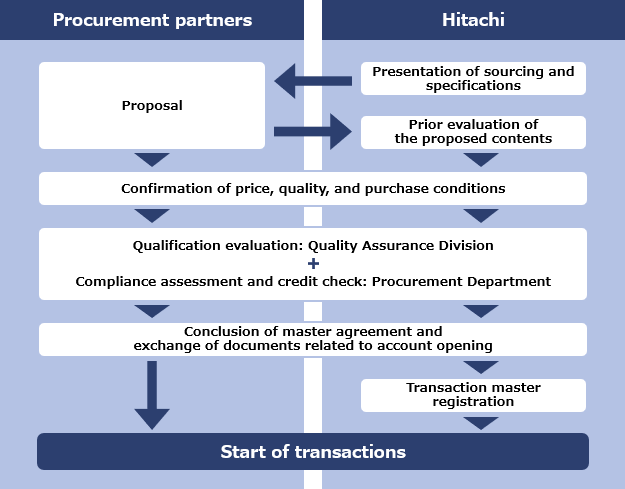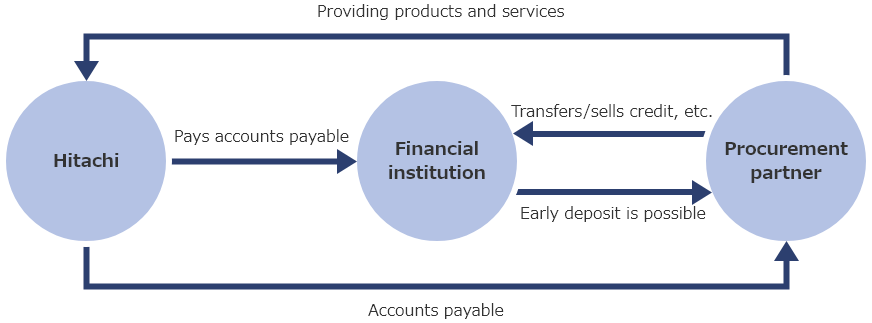To protect fair and free competition, Hitachi complies with basic rules regarding transactions, including domestic and international competition laws, and acts in accordance with laws and corporate ethics.
In addition, we develop the most suitable procurement partners from a global perspective, build fair and equitable business relationships, and strive to maintain and improve appropriate business relationships based on mutual understanding and trust. When selecting suppliers, in addition to evaluating quality, reliability, delivery time, price, management stability, technological development capabilities, etc., we also evaluate efforts related to social responsibilities, such as eliminating unfair discrimination, child labor, and forced labor.
Based on these assumptions, for procurement partners who are newly starting transactions with us, we would like to introduce the workflow to the start of transactions.

Hitachi's basic policy is to always comply with the priorities shown in the formula S>Q>D>C (Safety>Quality>Delivery>Cost), and to provide safety and security to our customers and society.
Hitachi acts based on the law and correct ethical principles, and is committed to corporate activities in accordance with its Basics and Ethics principles. In this way, Hitachi can ensure that it avoids violating any laws (including laws, cabinet orders, ministerial ordinances, ordinances, permits and licenses, etc.), including violations in the contracts with our customers. We would like to build friendly business relationships with our procurement partners through their understanding and support of these policies.
Before a procurement partner starts doing business with us, we will confirm that they maintain a certain level of quality. (This process is referred to as "certification.")
Certification includes confirming that the procurement partners have established a corporate structure that can maintain quality, and confirming that the parts and materials supplied by the procurement partners meet the quality level required by the design and quality assurance departments of our business sites.
After procurement partners have passed this certification, we can start doing business together.
In addition to the certification before the start of business and at regular intervals after the start, we also conduct assessments on a continuing basis to maintain quality. If a partner cannot ensure and/or maintain a certain level of quality, the certification will be revoked.
To ensure reliability and safety, we may ask a procurement partner to obtain specific external certifications (ISO 9001, JIS, or UL, etc.) or to comply with specific laws or regulations (Electrical Appliance and Material Safety Act, Consumer Product Safety Act, etc.).
We place emphasis on monitoring changes in 4M*1 and on traceability*2 management methods at our procurement partners.
We request that procurement partners follow the quality rules and standards of the relevant office of Hitachi Ltd. and consolidated subsidiaries.
If a procurement partner changes their processes (for example, changes a 4M component) after our certification, we will conduct a certification assessment again. Please contact us each time you make such a change.
Finally, at each business site of Hitachi, Ltd. and its consolidated subsidiaries for hardware products, we are planning to introduce a unified standard certification system mainly for hardware procurement. Through this system, we would like to develop in a direction that not only ensures the stable quality of our products, but also creates benefits for our procurement partners. We appreciate the cooperation and understanding of our procurement partners as we work together to improve quality.
Through procurement transactions, Hitachi aims to improve the productivity of our procurement partners and all employees and also aims to promote the transformation to a sustainable society where diverse human resources can play an active role.
To accomplish these goals, Hitachi believes it is essential to realize paperless work environments, which enable ideal working styles in the new normal, and to accelerate the digitization of social infrastructure on a global scale.
While complying with various related laws in contracts with procurement partners, Hitachi will promote the digitization of procurement transactions based on the agreement of both the ordering party and the contractor.
Based on the above policy, Hitachi is promoting the digitization of procurement transactions as follows.
Hitachi provides a variety of EC services as TWX-21, which offers total support for dynamic business collaboration between companies. Provided services include a secure network infrastructure, highly scalable business platforms, and business applications required for inter-company transactions. Hitachi will actively use TWX-21 as a transaction exchange infrastructure that connects the procurement departments of each business site and procurement partners.
Hitachi is using electronic signatures in contracts with procurement partners to achieve a more flexible working style in the new normal. Using electronic signatures to conclude contracts not only contributes to improving the productivity of both contracting parties, but also has the advantage of shortening the number of days required for the conclusion procedure.
Hitachi will also promote digitalization in the area of sustainable procurement to develop business activities that emphasize sustainability in the value chain. In addition, it is necessary to utilize a large amount of diverse data in order to visualize CO2 emissions in the supply chain, so Hitachi will accelerate the use of digital technologies to contribute to our environmental targets, achieving carbon neutrality in FY 2050 through the value chain.
Hitachi strives to pay its procurement partners efficiently and effectively. By utilizing the supply chain finance mechanism shown below, business partners can monetize at an early stage by transferring or selling the credit for deliverables to financial institutions at a discount rate based on Hitachi's credit rating. This enables procurement partners to improve their cash flow and optimize their working capital.
